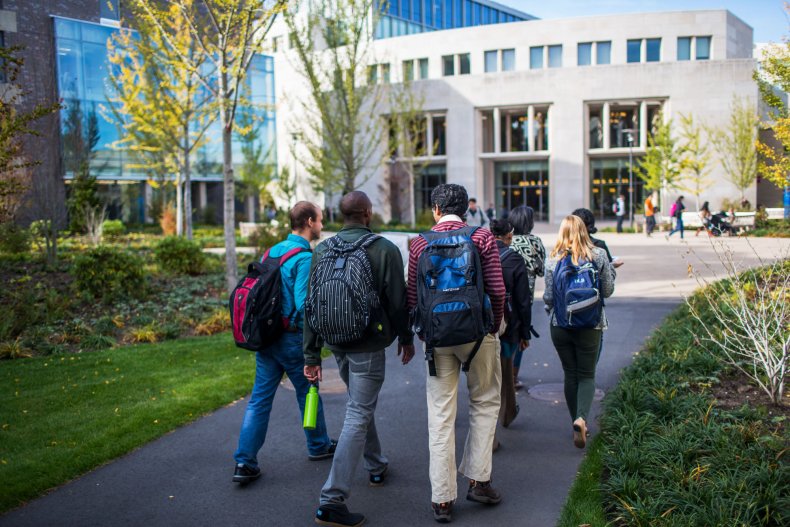A lawsuit has been filed against Harvard University on behalf of Black and Latino organizations in the wake of the Supreme Court's decision last week to constitutionally eliminate affirmative action.
The Boston, Massachusetts-based nonprofit Lawyers for Civil Rights (LCR) filed the complaint on Monday with the U.S. Department of Education's (DOE) Office for Civil Rights (OCR), alleging that Harvard University's admissions system violated Title XI of the Civil Rights Act. The suit scrutinizes the university's history of legacy admissions.
Harvard, along with the University of North Carolina, was part of the affirmative action lawsuit that reached the Supreme Court after the conservative organization Students for Fair Admissions, led by Edward Blum, challenged the use of race-based admissions nationwide.
Michael Kippens, litigation fellow at LCR, told Newsweek via phone that the Supreme Court's decision to end affirmative action "heightened the urgency of asking the Department of Education to investigate" donor and legacy preferences, making it more "critical and crucial" for such preferences to be eliminated in order to create an equitable and fair admissions process with respect to applicants of color.
"Why are we rewarding children for privileges and advantages accrued by prior generations?" said LCR Executive Director Ivan Espinoza-Madrigal in a statement. "Your family's last name and the size of your bank account are not a measure of merit and should have no bearing on the college admissions process."
The newly filed lawsuit alleges that students who receive preferential treatment, defined as "donor and legacy preferences," constitute up to 15 percent of Harvard's admitted students and "are significantly more likely to be accepted than other applicants."

The complaint was filed on behalf of African Community Economic Development of New England, Chica Project, and the Greater Boston Latino Network. Newsweek reached out to all three groups via email for comment.
"Each year, Harvard College grants special preference in its admissions process to hundreds of mostly white students—not because of anything they have accomplished, but rather solely because of who their relatives are," the lawsuit reads.
"We would like to see the Department of Education open an investigation into this preferential treatment," Kippens said of the lawsuit's intent. "Opening an investigation is the first step. Secondly, declare that this practice of offering preferences to applicants is discriminatory in that it heavily favors white applicants."
He cited data, also included in the lawsuit, that approximately 70 percent of donor-related and legacy applicants are white. Also, between the years 2014 and 2019, donor-related applicants were nearly seven times more likely to be admitted compared to non-donor-related applicants while legacy applicants were nearly six times more likely to be admitted compared to non-legacy applicants.
Such preferences are not justified by any educational necessity because Harvard cannot show that the use of these preferences is necessary to achieve any important educational goal, the lawsuit states, adding, "The benefit is derived simply from being born into a particular family."
A DOE spokesperson told Newsweek that OCR does not confirm complaints.
A spokesperson for Harvard also declined to comment to Newsweek, instead issuing a prepared statement.
"Last week, the University reaffirmed its commitment to the fundamental principle that deep and transformative teaching, learning, and research depend upon a community comprising people of many backgrounds, perspectives and lived experiences," the statement reads. "As we said, in the weeks and months ahead, the University will determine how to preserve our essential values, consistent with the Court's new precedent."
A 'more creative' college admissions process
President Joe Biden lamented the affirmative action decision for "threatening to move the country backwards," calling on colleges and universities to learn about prospective students' financial means, hometown, and "personal experiences of hardship or discrimination, including racial discrimination" into account.
He said the DOE will consider different ways to be more transparent about college applications and enrollment trends, including first-generation and legacy status.
Olatunde Johnson, a professor at Columbia Law School, told Newsweek via phone that the complaint was not surprising. However, she said it remains to be seen whether an influx of similar lawsuits targeting donor and legacy preferences will occur.
"The Supreme Court's opinion really opened the door to [the complaint] by abolishing race and ethnicity-based affirmative action admissions, so it left those practices—such as legacy preferences and donor preferences—as an easy target for groups that are concerned about fairness in admissions," Johnson said.
She expects myriad universities to revisit questions around legacy preferences, which some analyzed even prior to the Court's decision.
But past lessons learned by institutions in California and Michigan, where affirmative action has ceased to exist since the mid-2000s, show a "worrisome" trajectory regarding admissions for Black, Latino, Vietnamese and Filipino students at the most selective schools.
Other things can be done to improve diversity, she added, including looking at transfer policies from community colleges; looking at the true weight of standardized testing in admissions. The same institutions need to think about their role beyond admissions.
"I think this is true for public and private institutions—what's your role in your community and expanding the pipeline and who can go to the school?" Johnson said. "And that's thinking more creatively about what's your role with regard to K-12 education and making that a place of opportunity for all students.
"So, I think that if we want this to be ultimately about questions of educating and providing access broadly, providing mobility broadly, schools are going to have to think more than just tweaking their admissions. They're going to have to think more creatively about responses."








